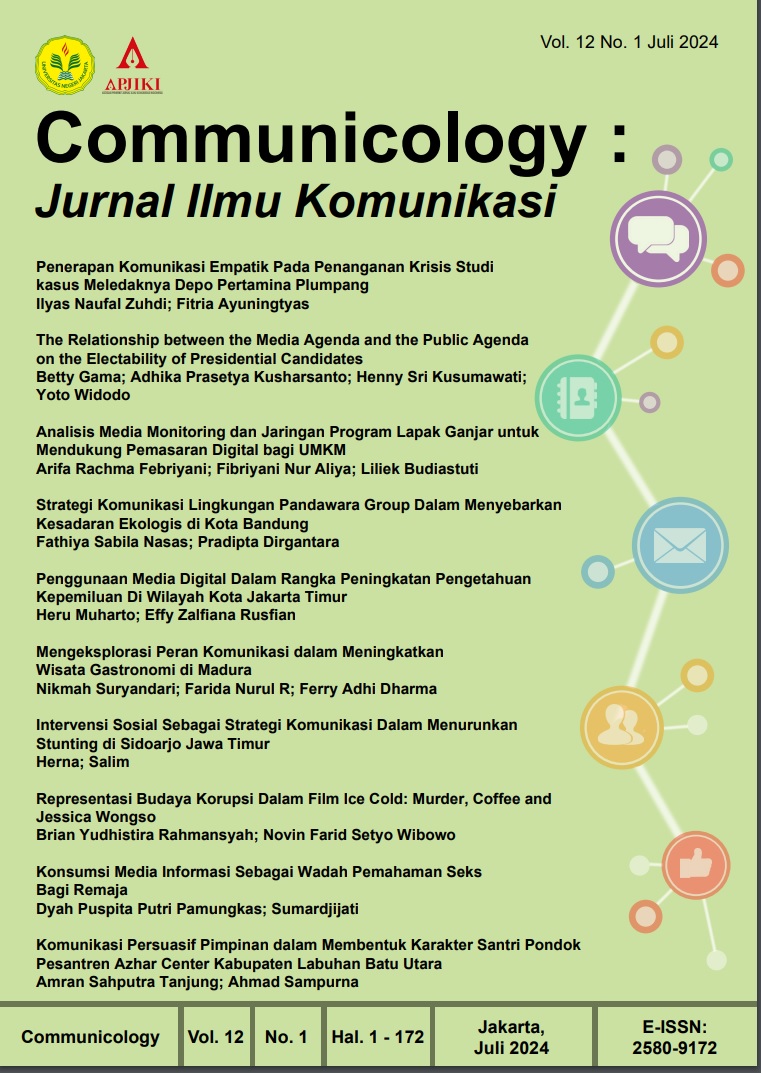Representasi Budaya Korupsi Dalam Film Ice Cold: Murder, Coffee and Jessica Wongso
DOI:
https://doi.org/10.21009/COMM.032.08Keywords:
Representasi, semiotika, Korupsi, Film, Coffee and Jessica WongsoAbstract
ABSTRACT
Corruption has become a common problem in Indonesia. Corruption in Indonesia has
existed since the colonial era and continues, starting from even the smallest level. Even
in 2022, the Indonesian NGO Wach Corruption found 579 cases, 1,396 suspects, and
state losses of IDR 42,747 trillion, bribes of IDR 693 billion, illegal levies of IDR 11.6
billion, and money laundering of IDR 955 billion. Therefore, this research aims to find
out how the culture of corruption is represented in the film Ice Cold: Murder, Coffee
and Jessica Wongso. Researchers use a qualitative approach and use semiotic methods,
especially John Fiske's codes. The subject used in this research is the film Ice Cold:
Murder, Coffee and Jessica Wongso, while the object of this research is the
representation of corruption culture in the film Ice Cold: Murder, Coffee and Jessica
Wongso. Through the film Ice Cold: Murder, Coffee and Jessica Wongso, Reza
Indragiri and Yudi Wibowo succeeded in showing that in Indonesia today the culture of
corruption is still very common, such as the bribery case told by Reza Indragiri and
Yudi Wibowo's opinion that in Indonesia today everything is about money, which is even
Justice can also be bought even by bribing the person concerned.
References
Fiske, J, and H Jenkins. 2010. Introduction to Communication Studies. Routledge. https://books.google.co.id/books?id=1QlTSAAACAAJ.
Giles, J, and T Middleton. 2008. Studying Culture: A Practical Introduction. Wiley. https://books.google.co.id/books?id=3p2FEAAAQBAJ.
Hall, S. 1997. Representation: Cultural Representations and Signifying Practices. SAGE Publications. https://books.google.co.id/books?id=Vs-BdyhM9JEC
Hidayatullah, Nur Afghan. 2016. “REPRESENTASI KEKERASAN DALAM FILM ‘JAGAL’ THE ACT OF KILLING ( ANALISIS SEMIOTIK ).” Skripsi, Institut Agama Islam Negri..
Irfan, N. 2011. Korupsi Dalam Hukum Pidana Islam. Amzah. https://books.google.co.id/books?id=RUFLtwAACAAJ.
Klitgaard, R. 1998. Membasmi Korupsi. Yayasan Obor Indonesia. https://books.google.co.id/books?id=RHzHy4PPGoMC.
Napitupulu, D R W. 2010. KPK in Action. Raih Asa Sukses. https://books.google.co.id/books?id=PP76uQe_fyMC.
Pawito. 2007. Penelitian Komunikasi Kualitatif. Lembaga Kajian Islam dan Sosial (LKIS). https://books.google.co.id/books?id=zN5iDwAAQBAJ.
Rakhmat, J. 2013. Psikologi Komunikasi. PT Remaja Rosdakarya. https://books.google.co.id/books?id=riSdtQEACAAJ.
RumtheLeonard Rio DB, and Zulaikha. 2017. “Makna Keluarga Pada Kelompok Mafia: Analisis Semiotika Dalam Film The Godfather-I.” JURNAL KAJIAN MEDIA 01: 28–41.
Saleh, K W. 1983. Tindak Pidana Korupsi Dan Suap. Ghalia Indonesia. https://books.google.co.id/books?id=ud52AQAACAAJ.
Saputro, Crisnata Joko. 2013. “Representasi Korupsi Dalam Film Kita vs Korupsi.” Skripsi Sarjana, Universitas Kristen Satya Wacana.
Schoorl, J W, and R G Soekadijo. 1980. Modernisasi: Pengantar Sosiologi Pembangunan Negara-Negara Sedang Berkembang. Gramedia. https://books.google.co.id/books?id=H8KkGwAACAAJ.
Semma, M. 2008. Negara Dan Korupsi: Pemikiran Mochtar Lubis Atas Negara, Manusia Indonesia, Dan Perilaku Politik. Yayasan Obor Indonesia. https://books.google.co.id/books?id=ktwUaT9VvxAC.
Severin, W J, and J W Tankard. 2010. Communication Theories: Origins, Methods, and Uses in the Mass Media. Longman. https://books.google.co.id/books?id=XG9oPgAACAAJ.
Sobur, A. 2003. Semiotika Komunikasi. Remaja Rosdakarya. https://books.google.co.id/books?id=2y4lAAAACAAJ.
Utama, Anggie Adhitya, Dudy Zein, Teddy Kurnia Wirakusumah. 2012. “Representasi Korupsi Pada Iklan Rokok Djarum 76.” e.Jurnal mahasiswa Universitas Padjadjaran 01.
Vera, N. 2022. Semiotika Dalam Riset Komunikasi. pt rajagrafindo persada 1. https://books.google.co.id/books?id=xrwC0AEACAAJ.
Downloads
Published
How to Cite
Issue
Section
License
Authors who publish with this Journal agree to the following terms:
- Author retain copyright and grant the journal right of first publication with the work simultaneously licensed under a creative commons attribution licensethat allow others to share the work within an acknowledgement of the work’s authorship and initial publication of this journal.
- Authors are able to enter into separate, additional contractual arrangementfor the non-exclusive distribution of the journal’s published version of the work (e.g. acknowledgement of its initial publication in this journal).
- Authors are permitted and encouraged to post their work online(e.g. in institutional repositories or on their websites) prior to and during the submission process, as it can lead to productive exchanges, as well as earlier and greater citation of published works.
Users/public use of this website will be licensed to CC BY





